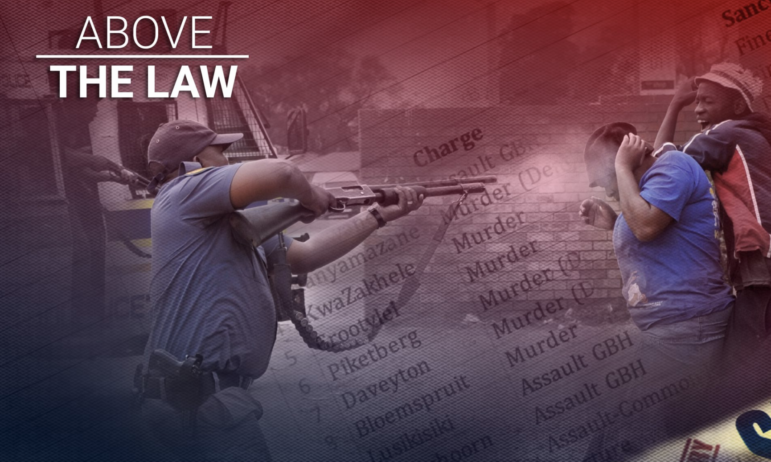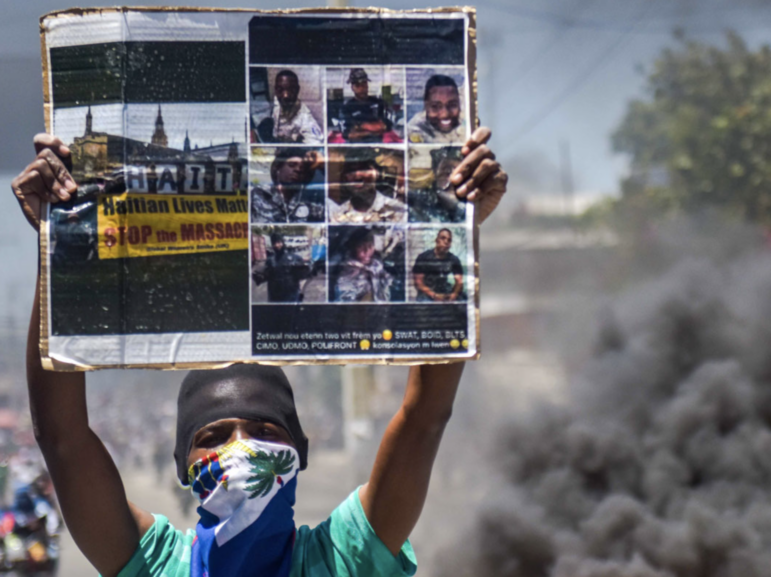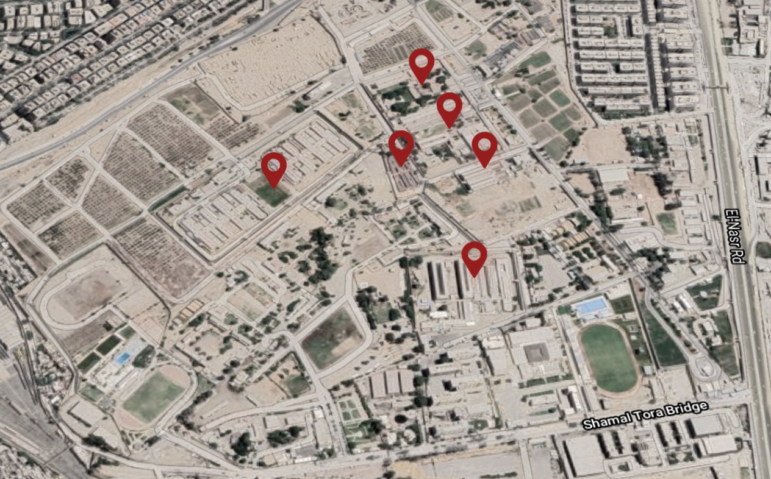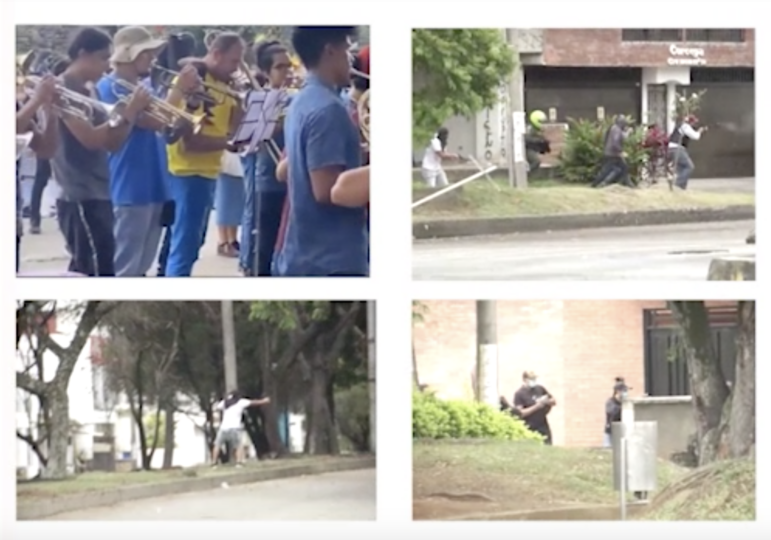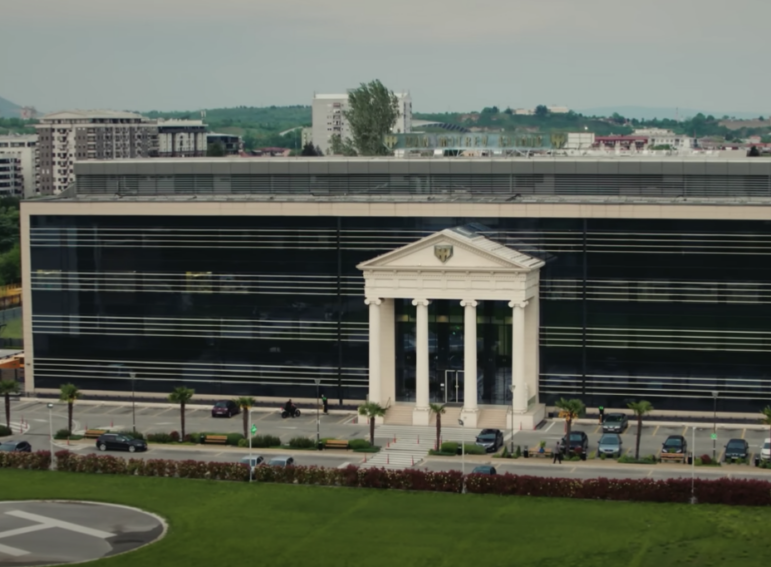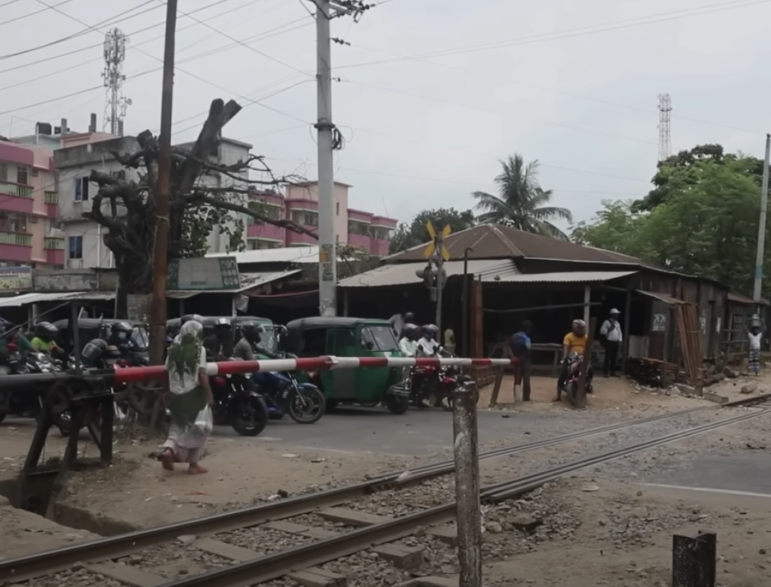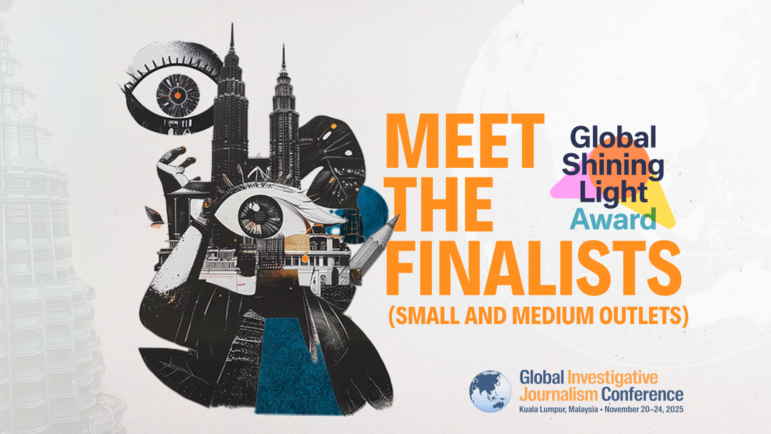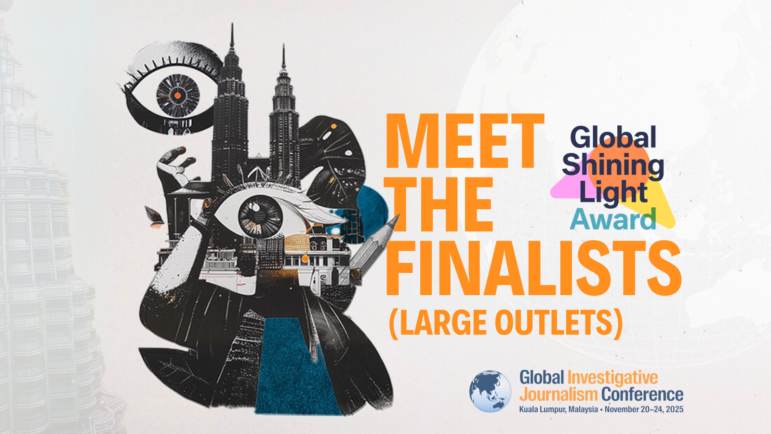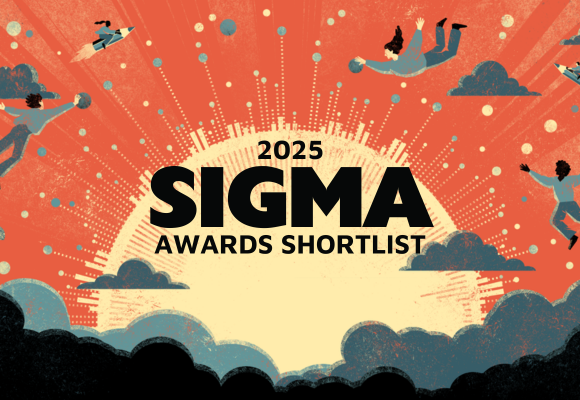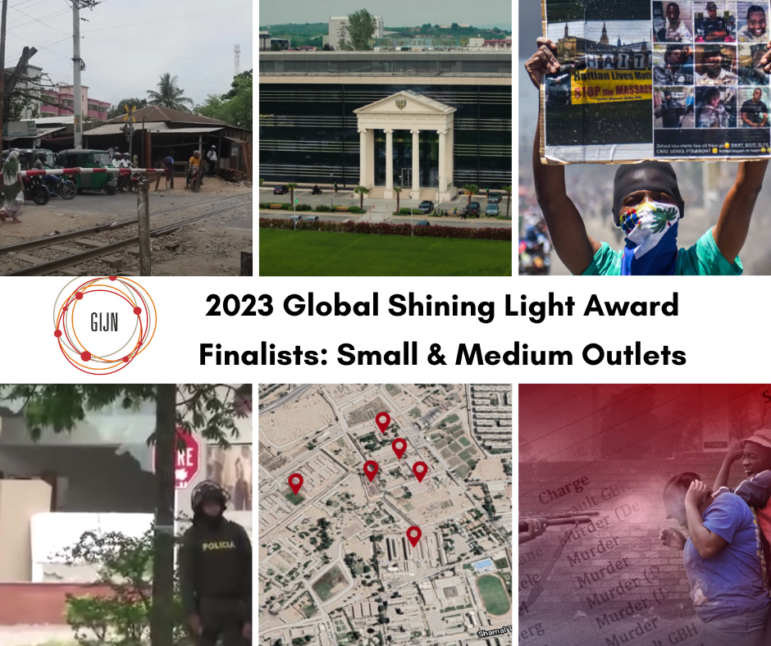

2023 Global Shining Light Award Finalists: Small and Medium Outlet Category
Yesterday, GIJN announced six finalists in the Large Outlets category for the 2023 Global Shining Light Awards — the prize that honors watchdog journalism in developing or transitioning countries carried out under threat, or in perilous conditions.Following a pause during the COVID-19 pandemic, the award ceremony will return at the 12th Global Investigative Journalism Conference (GIJC23) — the world’s premier international gathering of investigative and data journalists — to be held from September 19-22 in Gothenburg, Sweden.
Today, we reveal the six entries that were chosen by the award jury as finalists in the Small and Medium Outlets category (for organizations with staff of 20 or less, including freelancers).
Covering investigations published or broadcast in the period January 1, 2021 to December 31, 2022, the competition attracted a record 419 applications from 84 countries. A jury panel of veteran investigative editors from five global regions selected 12 total finalists from 11 countries.
The five jurors will remain anonymous until the announcement of the category winners on September 21. However, we include some remarks by the jurors in the below list, to help explain why these stories were worthy finalists, and to highlight best practice in the modern craft.
Entries chosen for the Small and Medium Outlets category shortlist came from Bangladesh, Haiti, Egypt, South Africa, Colombia, and North Macedonia. Notably, many of the chosen finalists from this category dealt with criminal justice failures and exploitation of the COVID-19 pandemic, and a couple showed how coronavirus measures were used as cover for systemic abuses of power.
In a statement from the panel on this shortlist of finalists, jurors were struck by the “depth, courage, and quality of investigative reporting by small outlets operating in environments where the lives and safety of journalists are at risk. Despite challenges on multiple fronts, these news organizations are doing the urgent and necessary work of exposing human rights abuses, the breakdown of the rule of law, and corrupt systems that endanger the health and welfare of citizens.”
The Global Shining Light Award specifically seeks to recognize courageous and innovative investigative reporting from the Global South and transitioning nations. With this in mind — and given the more than 400 submissions — the 2023 jury chose to focus on stories reported by local outlets, and reporting conducted within these challenging press environments. The judges “were impressed with the number of quality cross-border collaborative projects involving Western media, but we chose to place our emphasis on local and regional media outlets that did extraordinary work under duress.”
The award is sponsored by the Global Investigative Journalism Network, an association of 244 organizations in 90 countries that works to foster and strengthen investigative reporting around the world. Category winners will receive an honorary plaque, a $2,500 cash award, and a trip to the event in Sweden’s historic second city to accept the prize. The total number of entries was 43% higher than the previous competition, announced at GIJC19 in Hamburg.
2023 Shining Light Finalists: Small & Medium Outlets Category
Above the Law — Viewfinder (South Africa)
Reporter: Daneel Knoetze
Like many classical investigative stories that achieve lasting impact, this piece makes institutional failure, rather than wrongs by individual officials, its central focus. This multi-year investigative series revealed a stunning lack of accountability for South African police officers implicated in crimes like rape, torture, assault, and even murder — as well as a system that enables rogue cops to reoffend. It also held individuals to account, despite the constant risk of reprisal. Remarkably, Viewfinder — a tiny nonprofit news organization — also created a unique, easily searchable public database of tens of thousands of registered complaints about police misconduct. Said one judge: “There was very intense reporting, and the storytelling is good, and, in every couple of sentences, you see a link to evidence the reporter provides — all kinds of documents.”
Kidnapping in Haiti — Caught in the Middle — Connectas and Enquête d’action (Haiti)
Reporter: Milo Milfort
This brave investigation shone a bright light on an underreported plague that now menaces the poorest nation in the Caribbean: an epidemic of kidnappings enabled by both a new ransom economy and impotent policing strategies. The story revealed that 60 kidnappings were being registered in Haiti each month, with dozens more going unrecorded. The investigation also found that the phenomenon has fueled a parallel rise in drug, arms, and human trafficking. Despite severe risks of reprisal or abduction, the reporter constructed a chilling picture of this unchallenged threat by interviewing victims, security experts, government officials, and human rights organizations. One juror remarked: “I thought it was rather startling; and very little investigative work comes out of Haiti. The footage of people being kidnapped was amazing.”
‘Scorpion’ Prison Cells Above the Law — ARIJ (Egypt)
Reporter: Moayad Bilal
This investigation revealed a series of government strategies to persecute prisoners and undermine justice in Egypt, as well as the desperate efforts of prisoners and families to obtain fair treatment. Using victims’ databases, criminal justice documents, and interviews, reporter Moayad Bilal revealed punitive carceral practices like “rotating prisoners,” “recycled detention orders,” and bans on visits, to effectively hide detainees within the prison system and strip them of their rights. While this series contributed to the release of some prisoners, ARIJ (Arab Reporters for Investigative Journalism) pointed out that many more people have been newly detained under the draconian prosecutions of Egypt’s repressive regime. One juror noted: “It’s a very rare story on this issue for the region, and human rights violations in Egypt are really egregious.”
The Deadly Ways Colombian Police Quell Protests, and Its Alliances with Armed Civilians — Cuestión Pública (Colombia)
Team: Diana Salinas, Claudia Báez, David Tarazona, Edier Buitrago, Ingrid Ramírez Fuquen, Andrea Rincón, José Marulanda, Nicolás Barahona, Mateo Restrepo, Valentina Hoyos, Iván Serrano, Paola Téllez, Sara Cely, Daneisi Rubio, Camilo Vallejo, Heidy González, Gerald Bermúdez, Natalia Barriga, Valeria Báez, José Jaramillo, Carlos Rodríguez, Alexander Campos, Ana Bejarano, David González, Jhonatan Buitrago, and Tomás Morales
During widespread protests against inequality and abuses of power in Colombia in May 2021, 14 protesters were killed and more than 100 wounded in the city of Cali after an attack by armed men in civilian clothes. In a multi-layered investigation that combined visual forensic methods with freedom of information requests and traditional reporting, Cuestión Pública showed how police and even political figures colluded with a brutal militia to silence the protest. Using open source tools and footage from 30 video clips, the team carefully reconstructed the violent events in the city on May 28, creating timelines and visualizations that proved the illicit coordination. They also obtained key evidence from audio clips and a WhatsApp group to reveal planning for the attack at a prior meeting. The awards panel noted: “The way the Colombian reporters used open source research was really innovative.”
Bad Blood — Investigative Reporting Lab (North Macedonia)
Team: Sashka Cvetkovska, Elena Mitrevska Cuckovska, Maja Jovanovska, Dajana Lazarevska, Lila Karatasheva, David Ilieski, Trifun Sitnikovski, Trajche Antonovski, Atanas Velkovski, Gorjan Atanasov, Mladen Pavleski, Vlatko Vladimirov, Luka Blazev, Denica Chadikovska, Martina Siljanovska, Sergej Sarchevski, Bojan Stojanovski, Aleksandra Denkovska, and Ivana Nasteska
In one of the most ambitious COVID-19 profiteering probes to emerge from the pandemic, an all-women reporting team decided to investigate coronavirus-related deaths, treatments, and patient billing at North Macedonia’s most prestigious private hospital. After months of investigations into several parallel angles, the Investigative Reporting Lab (a local member center of the Organized Crime and Corruption Reporting Project) found that the hospital had performed unsanctioned and unsafe blood purification treatments on numerous patients, while also concealing vital patient information and allegedly manipulating infection data. A striking feature of the effort was that these reporters were undeterred by the deep technical complexity of COVID-19 treatments, and a deluge of arcane medical spin from hospital executives. Said one judge: “This story was impactful, and how they went about their reporting was dogged and systematic.” Another juror added: “I think some people didn’t take these reporters’ inquiries too seriously — and then they nailed it!”
Secret Prisoners of Dhaka — Netra News (Bangladesh)
Team: Four journalists who cannot currently be named for safety reasons, along with Tasneem Khalil, Nazmul Ahasan, Zulkarnain Saer Khan, and David Bergman
In an important piece of watchdog journalism, Netra News — an exiled nonprofit newsroom for Bangladeshi audiences — revealed the existence of a secret detention center holding a wide range of dissidents and criminal suspects in the capital of Dhaka. This investigative documentary — which the outlet says has been viewed more than one million times — included testimony from former detainees, verification from current military officers, and photographs of the cramped and inhumane conditions inside. Prior to the final judging, a GIJN reviewer noted that “they are the only outlet I would say that covers the untold stories in the country, and are always at risk from the authorities. This particular story exposed a ‘torture cell’ of the Bangladesh military which is, in any circumstances, the bravest example of Bangladeshi journalism.”
Additional Resources
2023 Global Shining Light Award Finalists: Large Outlets Category
Investigations From Peru, Philippines, South Africa Win Global Shining Light Award
Drumroll Please! Our Global Shining Light Award Finalists Are…
 Rowan Philp is a reporter for GIJN. Rowan was formerly chief reporter for South Africa’s Sunday Times. As a foreign correspondent, he has reported on news, politics, corruption, and conflict from more than two dozen countries around the world.
Rowan Philp is a reporter for GIJN. Rowan was formerly chief reporter for South Africa’s Sunday Times. As a foreign correspondent, he has reported on news, politics, corruption, and conflict from more than two dozen countries around the world.





